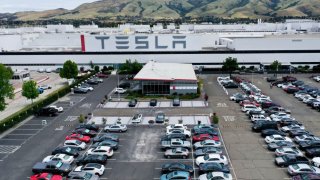
- Tesla shares dropped by more than 11% in Thursday trading after the company said it would not produce new model vehicles in 2022, and is not yet working on a $25,000 electric car.
- Nevertheless, analysts remained bullish on Tesla, pointing to the company's anticipated sales growth this year and its lead position in the battery electric vehicle market, a growing and increasingly competitive industry segment.
- On a Wednesday earnings call, CEO Elon Musk said the company plans this year to invest in research and development on a humanoid robot to work in the companies' factories.
Tesla shares dropped more than 11% in Thursday trading after the company said it would not produce new model vehicles in 2022 — and is not yet working on a hotly anticipated $25,000 electric car.
CEO Elon Musk broke the news to shareholders on a 2021 fourth-quarter earnings call after trading on Wednesday, noting that Tesla is still dealing with chip shortages that are expected to linger throughout the year.
The announcement dampened investors' hopes that this year would see Tesla begin to deliver on its sci-fi-inspired metal pickup, the Cybertruck, which it unveiled in November 2019, and the Semi, a heavy duty truck, which it announced in November 2017.
Get Connecticut local news, weather forecasts and entertainment stories to your inbox. Sign up for NBC Connecticut newsletters.
Executives instead said that Tesla will focus on scaling production at its new and existing factories, and on improving its driver-assistance technology currently marketed as a standard Autopilot option, as well as its premium option brand, Full Self-Driving.
Bernstein senior analyst Toni Sacconaghi asked Tesla execs on Wednesday's call, "If there is no $25,000 vehicle being worked on, is it really realistic to think that you can sell more than 3 million vehicles with two very high volume cars and Cybertruck in 2024?"
Money Report
Musk peevishly replied, "I mean, it is apparent from the questions that the gravity of Full Self-Driving is not fully appreciated."
Musk then explained that Tesla's driverless tech should eventually be so advanced that it will drive sales of the company's electric cars to the anticipated high volume of sales with or without adding new models at lower price points.
Tesla's cars are not considered "driverless" today, even with the company's premium system. The systems have been categorized by Tesla as Level 2, meaning that they don't meet the "SAE Level 4" standard used to denote a car that could handle every aspect of driving in some conditions without any human intervention.
When Tesla began to discuss its ambitions in self-driving technology in 2016, Musk said the company would conduct a hands-free trip across the US by late 2017. It has yet to complete that mission.
During the call, the Tesla CEO said the company plans this year to invest in research and development on a humanoid robot to work in the companies' factories.
"The most important product development we're doing this year is actually the Optimus humanoid robot," Musk said. "This, I think, has the potential to be more significant than the vehicle business over time."
Despite the decline in Tesla shares on Thursday, many analysts remained bullish and focused on the company's lead position in the battery electric vehicle market, a growing and increasingly competitive industry segment.
For example, Deutsche Bank research analyst Emmanuel Rosner wrote, "We continue to believe Tesla's impressive target trajectory for its battery technology, manufacturing capacity and especially cost could help accelerate the world's shift to electric vehicles and extend Tesla's EV lead considerably." The firm is maintaining a buy rating and target price of $1,200 for shares of Tesla.
Goldman Sachs' Mark Delaney reiterated a buy rating and a price target of $1,200 in a note on Thursday, emphasizing its automotive margins had reached a reported 29.2% in the fourth quarter, and it expects sales to grow this year more than 50%.
"Tesla continues to be one of the fastest-growing companies in the automotive ecosystem," he said.
On Full Self-Driving promises, Goldman Sachs analysts sounded a cautious but hopeful note. "Management reiterated its optimism around [Full Self-Driving] deployments and views software as an important part of its future profit and value creation. While we remain guarded on how quickly the company can achieve full autonomy given the delays the industry broadly (including Tesla) has encountered historically on [fully autonomous vehicles], we believe that Tesla remains well positioned to be a leader in AVs in the long-term given the broad range of technology and resources it is devoting to this area (including custom hardware, software and tools). "






